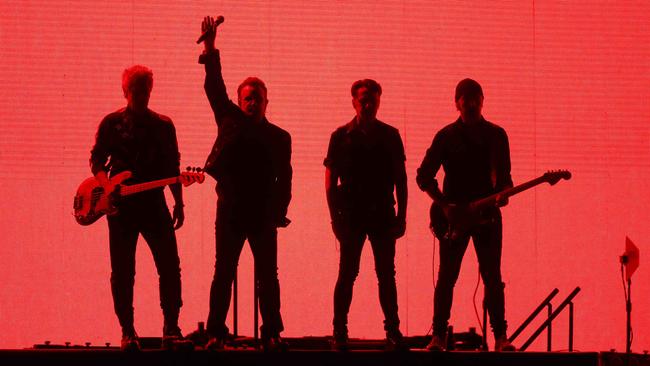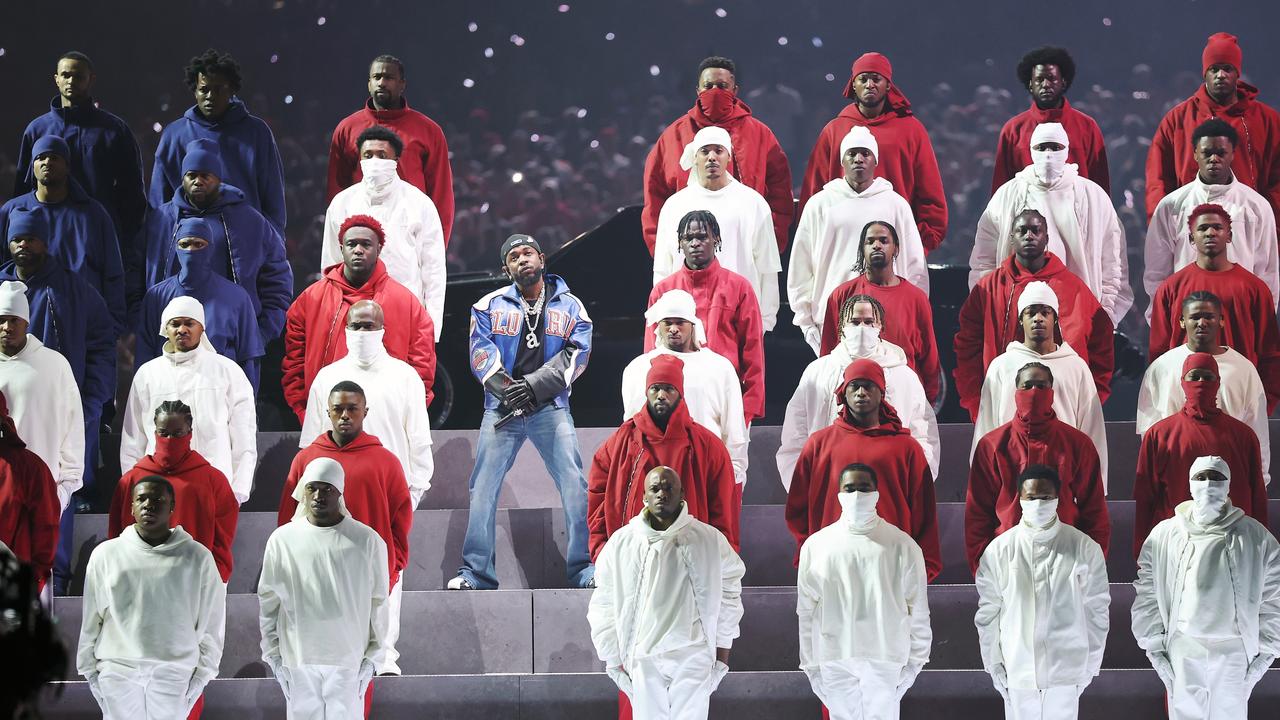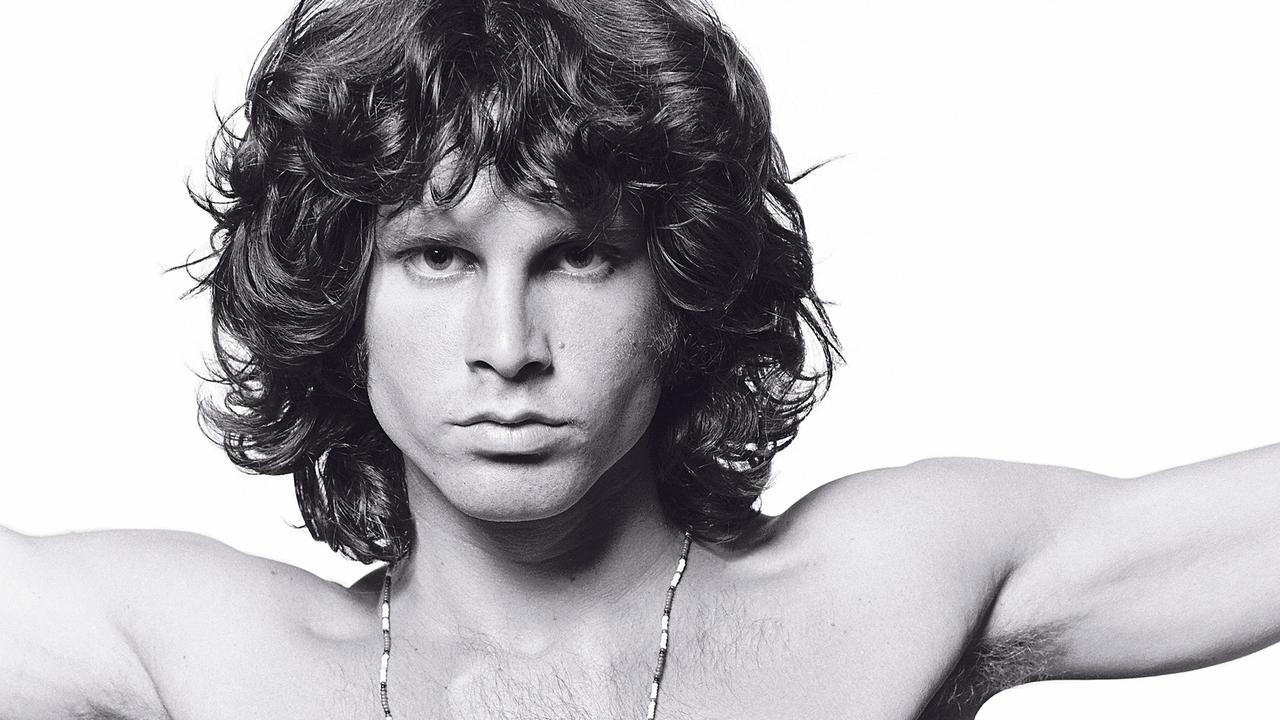Review: U2’s Joshua Tree tour opener in Brisbane disappoints with poor song choice
U2’s first Aussie show in nine years broke a maxim of show business and left us hoping for less.

Although the name of U2’s fifth album is printed on the ticket, the band’s first Australian concert in nine years did not open with The Joshua Tree. Instead, the Irish quartet opted to showcase some of its best achievements before that landmark set of songs.
The musicians’ arrival on stage was a visual representation of their 1983 single Sunday Bloody Sunday: first, drummer Larry Mullen Jr strode towards the centre of the stadium, where a small stage protruded into the audience. There, he began tapping out its distinctive military tattoo before being joined by crisp, clean guitar notes played by The Edge.
Behind him emerged Bono, the effervescent vocalist, whose first words of the night — “I can’t believe the news today / I can’t close my eyes and make it go away” — might have cut a little close to the bone for the tens of thousands in attendance, given the thick pall of smoke from nearby bushfires that had hung over Brisbane in recent days.
Not a terrible way to kick off a stadium gig, I guess ... #U2 opening their Brisbane show - and Australian tour - with Sunday Bloody Sunday. pic.twitter.com/bQinZaVjSH
— Daniel Johnson (@danjohnson1979) November 12, 2019
READ MORE: Story behind U2’s The Joshua Tree | U2’s Bono confronts his mortality
Last, Adam Clayton joined his bandmates while picking out a growling bassline.
This is U2 as it existed four decades ago: guitar, bass, drums, vocals and few other frills. The Edge is freed from prodding at a pedal board, with his effects apparently being handled offstage. Much later in the show, Bono will smirk as he describes the band as a “post-punk combo”, as its musicianship and ambitions clearly have long since outgrown those basic beginnings.
â¦@CathyFreemanâ© â¦@MagdaSzubanskiâ© Front and centre at U2 Brisbane xx pic.twitter.com/CDrz6j8Ax8
— Marg/Meg/Margaret (@liveitwell1) November 12, 2019
Much has changed since these four men composed these songs, both in their lives and in the wider world, yet what they wrote as much younger artists is still put across with vigour. The decision to open with a clutch of tracks released before U2’s biggest selling album is a great one, as it foregrounds the undeniable chemistry that fed into all of those works. Next was New Year’s Day, with the guitarist alternating between piano notes and swooping his hand down the fretboard to produce a shower of glittering harmonics. Then came 1984’s Bad, in which Bono interposed the chorus to Beds are Burning, with praise for firefighters at song’s end.
Every Breaking Wave @U2 #U2TheJoshuaTree2019 #brisbane pic.twitter.com/MBUFTdhWuF
— NaØmiD (@Naomi_U2Sydney) November 12, 2019
It was only after Pride (In the Name of Love) that the quartet stepped on to the much, much larger stage that filled one end of Suncorp Stadium and, after the fine entree of early songs, we settled in for the main course.
For many years the first song from 1987’s The Joshua Tree has been prized by the four musicians for its alchemical properties. In interviews, they have noted that, no matter how badly their night on stage may be going, they always have this one in their collective back pocket, ready and willing to turn a bronze gig to gold.
As the gigantic LED screen behind the band came to life with impossibly crisp black-and-white footage of a long drive down a straight desert road, Where the Streets Have No Name was proudly unfurled like a banner. It remains a deeply strange work, especially for a hit single: its extended introduction is all atmosphere. The Edge’s delayed guitar sounds pinballed around the stadium, and it was two minutes before Bono’s voice entered the mix. It is a thing of wonder that has lost none of its power.
The meat of the 140-minute set was the 11 songs of The Joshua Tree, played front to back, faithfully and with great skill. All of these songs essentially live or die depending on how Bono’s voice is faring and, at 59, his range and control remain impressive. The band had taken a year off from performing and only returned to the big stage for the two Auckland shows that preceded this one.
As ever, Bullet the Blue Sky and Exit were the moody outliers, built on heavy percussion and guitar pyrotechnics. Much of the rest of The Joshua Tree is upbeat and uplifting, and ideal for big outdoor venues. Before this tour, which began on the album’s 30th anniversary in 2017, Red Hill Mining Town had never been performed live. Yet it was a resounding highlight of this concert, with Bono’s aching chorus melody accompanied by a brass section shown on the big screen.
Just love these guys!@U2 #U2TheJoshuaTree2019 #brisbane pic.twitter.com/ojzq1UUvjZ
— Nicholas Ng (@NickNg_DPR) November 12, 2019
Trip Through Your Wires swung mightily on Clayton’s bassline, while the plaintive One Tree Hill was dedicated to the band’s New Zealand-born roadie Greg Carroll, who died in a motorcycle accident not long before work began on these songs. This was a wholly satisfying performance of what remains U2’s best album.
Things began to go south in the encore songs that followed, as they unintentionally emphasised the decline of U2’s songwriting in recent years. Here, the electrifying heights of the main set were offset by deadening lows. Elevation (2001) and Vertigo (2004) sounded thin and insipid when compared with the masterclass in layered, thoughtful compositions we had just witnessed.
All concerts are a balancing act between the artists pleasing the fans with familiar material, and pleasing themselves with newer works. U2 got the balance badly wrong here: it’s telling that a highlight of the eight-song encore was Every Breaking Wave, a piano ballad from 2014’s Songs of Innocence. It’s a fine song but, despite its strengths, the nature of the arrangement sucked the energy from the stadium like nothing else.
Dear Bono and U2 - With respect whoever did the sound in Brisbane fucked up big time. We can’t understand a word you are saying. Too much reverb. Great concert all the same. Thx #u2joshuatreetour2019 pic.twitter.com/ILOLRGtctb
— Ko Sally-ann ahau (@SallyannMoffat) November 12, 2019
The penultimate song, Love is Bigger Than Anything in Its Way — a deep cut from the band’s most recent album, 2017’s Songs of Experience — was a misfire. Like so much of the recent material, it’s a largely forgettable mid-tempo rocker. Immediately before it, though, 1991 song Ultraviolet (Light My Way) was accompanied by a rotating backdrop of notable women. Australians Cathy Freeman, Magda Szubanski, Hannah Gadsby and Nova Peris were among them, alongside Swedish teen activist Greta Thunberg.
The intent was laudable: four blokes comprising one of the world’s biggest bands, making a feminist statement calling for equality for all. That carried into final song One, which Bono introduced with a message of unity and solving our problems together.
The collective weight of this band’s quality material is heavier than most, yet in ending its first Australian show in nine years with more of a whimper than the roar that came before, U2 broke a maxim of show business. Rather than leaving us wanting more, it left us hoping for a little less.



